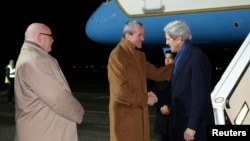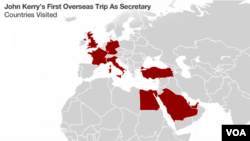BERLIN —
With the crisis in Syria topping his agenda, U.S. Secretary of State John Kerry arrived in Berlin late Monday on the second stop of his first foreign trip since taking over at the State Department.
His visit to Germany -- following his first stop in London -- will be short, but significant. Kerry is scheduled to meet with German Chancellor Angela Merkel and, later, with Russian Foreign Minister Sergey Lavrov. But the Syrian crisis will not be high on Lavrov's list of things to discuss with Kerry, said analyst Stefan Meister of the German Council on Foreign Relations.
"These deaths of Russian children in the United States will be the key issue in these meetings. It is very emotional right now in Russia," Meister said.
According to Meister, the death last week of a three-year-old Russian boy, apparently at the hands of his adoptive American mother, has shelved all other issues in the U.S.-Russian relationship. Meister thinks Russian President Vladimir Putin is using the tragic event to score domestic political points.
"The Russian leadership, the Putin regime in its third term, is very much under pressure. His ratings are going down. People are very unhappy with corruption and the end of any modernization in Russia. And that is why the Putin regime uses foreign policy issues to gain legitimacy for its own system," he explains.
Meister said European policy makers see the U.S. "reset policy" towards Russia as effectively over ... but that what comes next is unclear. He suggested lack of domestic interest in the Syria conflict also is stalling any Russian action.
"Nobody cares about Syria in Russia," he said. "This is not a topic there like it is in Western countries, where we see people dying on TV everyday."
As for Kerry's choice of Europe as his first stop, European Council on Foreign Relations Berlin-based analyst Olaf Boehnke said it is being viewed favorably in London and the German capital.
"For the last 12 months, we had a debate on the 'pivot' to Asia, and what it means for Europe. And some of these complaints were emotional," said Boehnke. "Sort of like 'The United States fell out of love with Europe' - but now, by appointing Secretary of State Kerry, as well as Chuck Hagel, this was a clear signal towards Europe that we are not forgotten."
Boehnke said he thinks German policy makers were happy when they learned Kerry's second stop would be Berlin. According to Boehnke, political commentators say Kerry's meetings with Chancellor Angela Merkel and Foreign Minister Guido Westerwelle would likely include a discussion of the ongoing European economic crisis and reform efforts.
Kerry's 11-day tour includes visits to Paris, Rome, Ankara, Cairo, Riyadh, Abu Dhabi and Doha.
His visit to Germany -- following his first stop in London -- will be short, but significant. Kerry is scheduled to meet with German Chancellor Angela Merkel and, later, with Russian Foreign Minister Sergey Lavrov. But the Syrian crisis will not be high on Lavrov's list of things to discuss with Kerry, said analyst Stefan Meister of the German Council on Foreign Relations.
"These deaths of Russian children in the United States will be the key issue in these meetings. It is very emotional right now in Russia," Meister said.
John Kerry's First Overseas Trip As Secretary of State
John Kerry's First Overseas Trip As Secretary of State- Traveling from February 24 to March 6
- Visits Britain, Germany, France, Italy, Turkey, Egypt, Saudi Arabia, United Arab Emirates and Qatar
- Kerry has described the trip as a "listening tour"
- Will meet with senior officials and leaders, as well as U.S. embassy staff
- Talks will be wide-ranging, from Syria to missile defenses
"The Russian leadership, the Putin regime in its third term, is very much under pressure. His ratings are going down. People are very unhappy with corruption and the end of any modernization in Russia. And that is why the Putin regime uses foreign policy issues to gain legitimacy for its own system," he explains.
Meister said European policy makers see the U.S. "reset policy" towards Russia as effectively over ... but that what comes next is unclear. He suggested lack of domestic interest in the Syria conflict also is stalling any Russian action.
"Nobody cares about Syria in Russia," he said. "This is not a topic there like it is in Western countries, where we see people dying on TV everyday."
As for Kerry's choice of Europe as his first stop, European Council on Foreign Relations Berlin-based analyst Olaf Boehnke said it is being viewed favorably in London and the German capital.
"For the last 12 months, we had a debate on the 'pivot' to Asia, and what it means for Europe. And some of these complaints were emotional," said Boehnke. "Sort of like 'The United States fell out of love with Europe' - but now, by appointing Secretary of State Kerry, as well as Chuck Hagel, this was a clear signal towards Europe that we are not forgotten."
Boehnke said he thinks German policy makers were happy when they learned Kerry's second stop would be Berlin. According to Boehnke, political commentators say Kerry's meetings with Chancellor Angela Merkel and Foreign Minister Guido Westerwelle would likely include a discussion of the ongoing European economic crisis and reform efforts.
Kerry's 11-day tour includes visits to Paris, Rome, Ankara, Cairo, Riyadh, Abu Dhabi and Doha.








